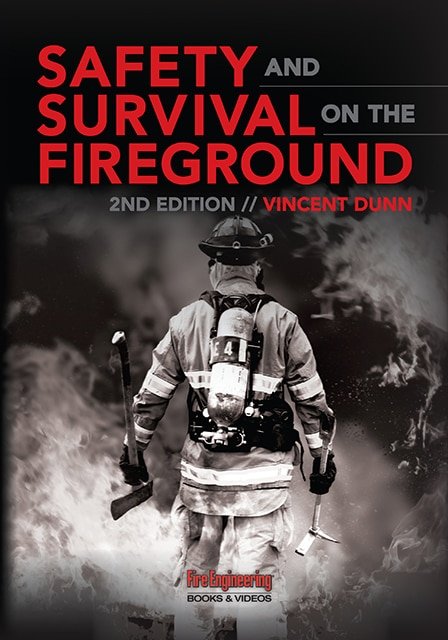 Image 1 of
Image 1 of


Safety and Survival on the Fireground, 2nd Edition
Chief Dunn—the recipient of FDNY's Lifetime Achievement Award—has updated his classic book on how to identify and survive hazards on the fireground. Dunn attempts to reduce firefighter deaths and injuries year after year by describing the 15 most dangerous tactics and the 13 most recurring fire and explosion environmental dangers, ranked by degree of danger and frequency of occurrence.
This indispensable book will help keep every first responder, firefighter, and fire officer out of harm’s way. It is a must-read and reread for every firefighter who responds to fires and emergencies, every company officer who commands a fire company, and every incident commander or safety officer who is responsible for the safety of firefighters on the fireground.
NEW TO THIS EDITION:
Examination of “aggressive interior firefighting attack” and “nonaggressive attack”
Discussion of risk intensity and risk frequency at the fireground
Visual representation and discussion of the NIST five-stage time/temperature fire growth curve showing temperatures before and after firefighter venting
Coverage of the Columbia University Capstone Project: FDNY Property Saved Indicator, with a formula to quickly calculate the dollar amount of property saved at a structure fire
Updated statistics, graphs, and charts
TABLE OF CONTENTS
1. Death and injury statistics
2. Collapse rescue dangers
3. Responding and returning dangers
4. Searching for fire location dangers
5. Advancing the initial attack hoseline dangers
6. Operating above fire dangers
7. Peaked and flat roof dangers
8. Cellar fire dangers
9. Propane gas fire dangers
10. Wildfire dangers
11. Aerial ladder climbing dangers
12. Forcible entry dangers
13. Master stream operation dangers
14. Dangers of outside venting
15. Fire escape dangers
16. Overhauling dangers
17. Risk analysis dangers
18. Interior firefighting dangers
19. Exterior firefighting dangers
20. Safe firefighting practices: 60 ways to survive firefighting
21. Firefighting dangers: causes of death and injury
22. Fire hazard identification and assessment
23. Safety orders and actions
24. Firefighter’s legacy
Appendix: Is your fire department safe?
Vincent Dunn ISBN: 9781593703493
Chief Dunn—the recipient of FDNY's Lifetime Achievement Award—has updated his classic book on how to identify and survive hazards on the fireground. Dunn attempts to reduce firefighter deaths and injuries year after year by describing the 15 most dangerous tactics and the 13 most recurring fire and explosion environmental dangers, ranked by degree of danger and frequency of occurrence.
This indispensable book will help keep every first responder, firefighter, and fire officer out of harm’s way. It is a must-read and reread for every firefighter who responds to fires and emergencies, every company officer who commands a fire company, and every incident commander or safety officer who is responsible for the safety of firefighters on the fireground.
NEW TO THIS EDITION:
Examination of “aggressive interior firefighting attack” and “nonaggressive attack”
Discussion of risk intensity and risk frequency at the fireground
Visual representation and discussion of the NIST five-stage time/temperature fire growth curve showing temperatures before and after firefighter venting
Coverage of the Columbia University Capstone Project: FDNY Property Saved Indicator, with a formula to quickly calculate the dollar amount of property saved at a structure fire
Updated statistics, graphs, and charts
TABLE OF CONTENTS
1. Death and injury statistics
2. Collapse rescue dangers
3. Responding and returning dangers
4. Searching for fire location dangers
5. Advancing the initial attack hoseline dangers
6. Operating above fire dangers
7. Peaked and flat roof dangers
8. Cellar fire dangers
9. Propane gas fire dangers
10. Wildfire dangers
11. Aerial ladder climbing dangers
12. Forcible entry dangers
13. Master stream operation dangers
14. Dangers of outside venting
15. Fire escape dangers
16. Overhauling dangers
17. Risk analysis dangers
18. Interior firefighting dangers
19. Exterior firefighting dangers
20. Safe firefighting practices: 60 ways to survive firefighting
21. Firefighting dangers: causes of death and injury
22. Fire hazard identification and assessment
23. Safety orders and actions
24. Firefighter’s legacy
Appendix: Is your fire department safe?
Vincent Dunn ISBN: 9781593703493
Chief Dunn—the recipient of FDNY's Lifetime Achievement Award—has updated his classic book on how to identify and survive hazards on the fireground. Dunn attempts to reduce firefighter deaths and injuries year after year by describing the 15 most dangerous tactics and the 13 most recurring fire and explosion environmental dangers, ranked by degree of danger and frequency of occurrence.
This indispensable book will help keep every first responder, firefighter, and fire officer out of harm’s way. It is a must-read and reread for every firefighter who responds to fires and emergencies, every company officer who commands a fire company, and every incident commander or safety officer who is responsible for the safety of firefighters on the fireground.
NEW TO THIS EDITION:
Examination of “aggressive interior firefighting attack” and “nonaggressive attack”
Discussion of risk intensity and risk frequency at the fireground
Visual representation and discussion of the NIST five-stage time/temperature fire growth curve showing temperatures before and after firefighter venting
Coverage of the Columbia University Capstone Project: FDNY Property Saved Indicator, with a formula to quickly calculate the dollar amount of property saved at a structure fire
Updated statistics, graphs, and charts
TABLE OF CONTENTS
1. Death and injury statistics
2. Collapse rescue dangers
3. Responding and returning dangers
4. Searching for fire location dangers
5. Advancing the initial attack hoseline dangers
6. Operating above fire dangers
7. Peaked and flat roof dangers
8. Cellar fire dangers
9. Propane gas fire dangers
10. Wildfire dangers
11. Aerial ladder climbing dangers
12. Forcible entry dangers
13. Master stream operation dangers
14. Dangers of outside venting
15. Fire escape dangers
16. Overhauling dangers
17. Risk analysis dangers
18. Interior firefighting dangers
19. Exterior firefighting dangers
20. Safe firefighting practices: 60 ways to survive firefighting
21. Firefighting dangers: causes of death and injury
22. Fire hazard identification and assessment
23. Safety orders and actions
24. Firefighter’s legacy
Appendix: Is your fire department safe?
Vincent Dunn ISBN: 9781593703493

